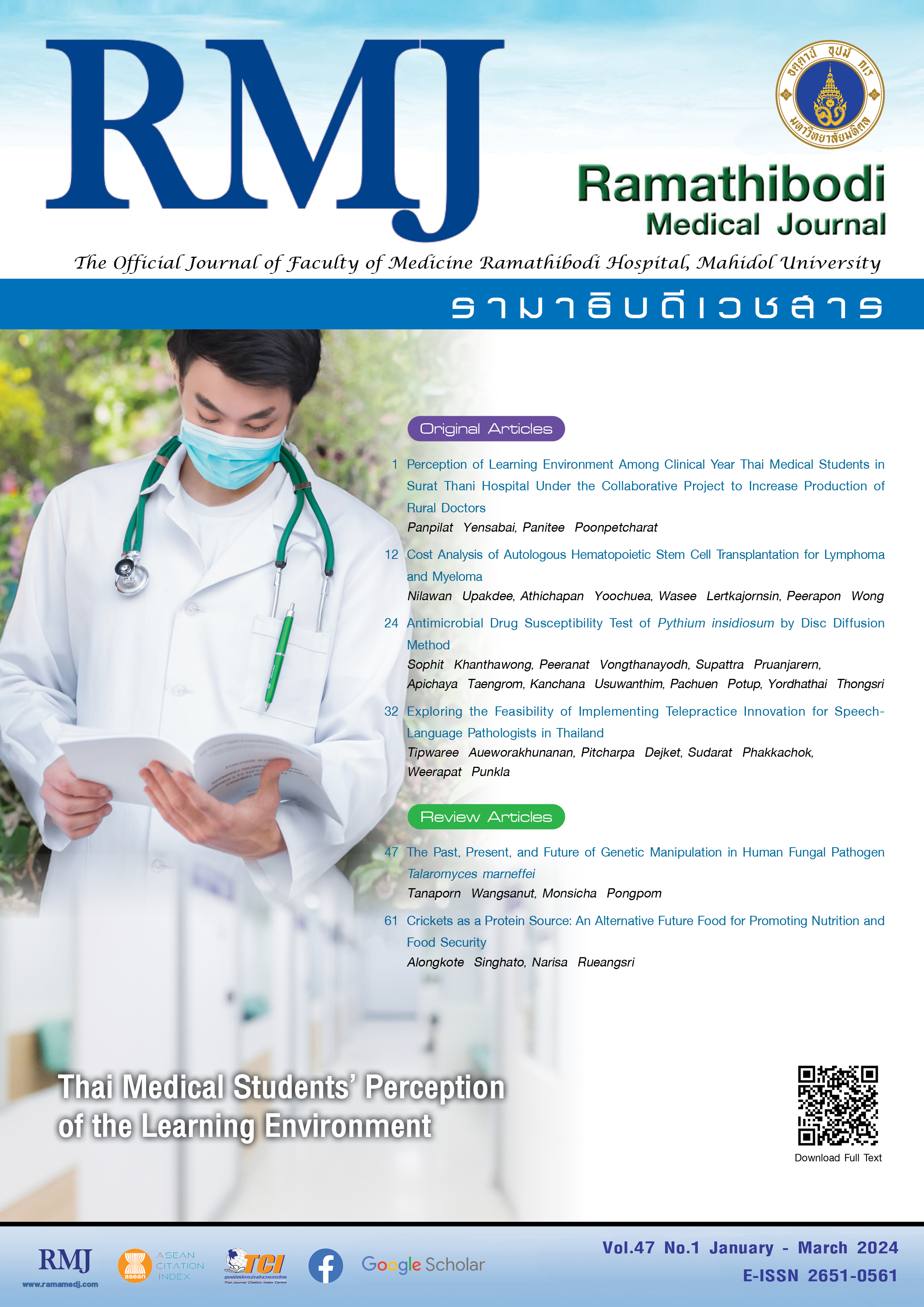Perception of Learning Environment Among Clinical Year Thai Medical Students in Surat Thani Hospital Under the Collaborative Project to Increase Production of Rural Doctors
DOI:
https://doi.org/10.33165/rmj.2024.47.1.266341Keywords:
Learning environment, Perception, Clinical year Thai medical students, Collaborative project to increase production of rural doctorsAbstract
Background: Appropriate learning environments were associated with better well-being of medical students, resulting in good learning.
Objective: To study perceptions and factors affecting perceptions of the learning environment among clinical year medical students in Surat Thani Hospital, Thailand.
Methods: In a cross-sectional descriptive study, data were collected among 89 medical students (4th - 6th year) from September 1, 2022, to November 30, 2022, using an online questionnaire consisting of the Thai Learning Climate Measure and an open-ended questionnaire.
Results: The response rate was 65.17% of the total medical students. Most participants were female and had a GPA of 3.00 - 3.49. The average score of learning environment perception was 70%. The aspect with the highest score were “colleagues” and “mental support”. The aspect with the lowest scores was “health and stress”. Female 6th-year medical students perceived the learning experience aspect significantly better than males, while other aspects showed no statistically significant difference (P > .05) when comparing gender, school year, and GPA. “Physical environments” and “health and stress” aspects were the areas that need to be improved in clinical years medical students’ perspective.
Conclusions: Most medical students perceived the learning environment positively. Strengths include “teachers”, “colleagues”, “learning experience”, “motivation”, and “mental support” aspects. The “physical environments” and “health and stress” aspects were the areas that need to be improved.
References
Saipanish R. Stress among medical students in a Thai medical school. Med Teach. 2003;25(5):502-506. doi:10.1080/0142159031000136716
Kolkijkovin V, Phutathum S, Natetaweewat N, et al. Prevalence and associated factors of depression in medical students at Faculty of Medicine Vajira Hospital, Urban University. J Med Assoc Thail. 2019;102(9):104.
Phanhan S, Panthai B, Srihaset K. Factors affecting learning stress of 4th - 6th year medical students. Faculty of Medicine Ramathibodi Hospital, Mahidol University. Veridian E-Journal, Silpakorn University. 2018;11(3):2579-2593.
Wasson LT, Cusmano A, Meli L, et al. Association between learning environment interventions and medical student well-being: a systematic review. JAMA. 2016;316(21):2237-2252. doi:10.1001/jama.2016.17573
Dyrbye LN, Satele D, West CP. Association of characteristics of the learning environment and US medical student burnout, empathy, and career regret. JAMA Netw Open. 2021;4(8):e2119110. doi:10.1001/jamanetworkopen.2021.19110
Roff S, McAleer S, Harden RM, et al. Development and validation of the Dundee Ready Education Environment Measure (DREEM). Med Teach. 1997;19(4):295-299. doi:10.3109/01421599709034208
Hongkan W, Arora R, Muenpa R, Chamnan P. Perception of educational environment among medical students in Thailand. Int J Med Educ. 2018;9:18-23. doi:10.5116/ijme.5a4a.1eda
Wangsaturaka D, McAleer S. Development of the clinical learning climate measure for undergraduate medical education. South East Asian Journal of Medical Education. 2008;2(2):41-51.
Wangsaturaka D. Development for Learning Climate Measures for Thai Medical Education. Dissertation. University of Dundee; 2005.
Wu MJ, Zhao K, Fils-Aime F. Response rates of online surveys in published research: a meta-analysis. Computers in Human Behavior Reports. 2022;7(2):100206. doi:10.1016/j.chbr.2022.100206
Abdulloh W, Niemted W. Arrangement of learning environment to promote learning skills in the 21st century “Concept Theory and Practice”. Princess of Naradhiwas University Journal of Humanities and Social Sciences. 2020;7(2):227-246.
Untaaveesup S, Tiawwanakul T, Somapee W, Tienkreua C. Prevalence and factors associated with stress in medical students at Ratchaburi Medical Education Center, Ratchaburi Hospital. J Psychiatr Assoc Thailand. 2021;66(2):159-172.
Downloads
Published
How to Cite
Issue
Section
License
Copyright (c) 2024 Ramathibodi Medical Journal

This work is licensed under a Creative Commons Attribution-NonCommercial-NoDerivatives 4.0 International License.

















